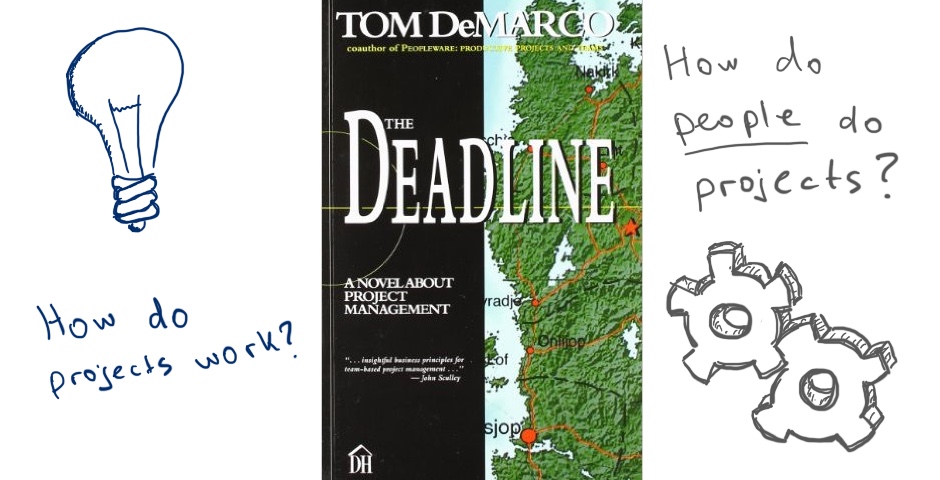Hello my friend,
Recently I’ve found in Internet an interesting book, which description has intrigued me a lot. The book is called “The Deadline” written by Tom DeMarco. It’s advertised as a novel about project management, so I decided to buy and read it. In a short words, it is worth it.
What is it about?
The book is really good written. I’ve got a lot of pleasure reading “The Deadline” for the first time and I’m about to read it again in order to think about some details again. It’s really written as novel, where we have good and bad characters, which play certain roles, landscapes, where the story happens, and actions themselves. That’s why it’s very easy and interesting to read “The Dedline”, at least in my opinion. On the other hand it isn’t just a novel, but it’s a novel about project management. That’s why each chapter is ended with short thesis, which contains key ideas from the chapter, which are applicable to project management. If you were very rapt during reading the content of the chapter, as I was, this thesis will remind you about outcomes you should understand and remember.
I’ve searched some information about author, because I had no desire to read something from those modern guys, which haven’t managed any projects themselves. Unfortunately I saw such “consultants” or “instructors” in my life (and such example is also good described in this book) and they don’t inspire me at all. Wiki tells that Tom DeMarco has very wide experience in development of software and management of this process. This information also (besides good advertisement) convinced me to read this book.
Key points for me
The main idea, which I give the first place in my ladder, is that the most important part of any project is team and people. As main character says in one of the beginning chapters “people do projects”, and then he continues with detailed explanation. According to him, the main tasks for the project manager are:
- Find right people
- Give to everyone the most appropriate job
- Develop and inspire team
- Keep the team together in critical situation
Though these statements seem to be very easy and obvious, I haven’t attended so much attention to these things previously myself. I’ve compared that with what we have in PMBOK. Actually we have the Project Human Resource Management Knowledge Area, but it just briefly discuss the 4 Processes (Plan Human Resource Management, Acquire Team, Develop Team and Manage Team). For sure “one size doesn’t fit all”, so “The Deadline” by Tom DeMarco provide many interesting information (and practical advices) about team management and in overall interpersonal relationships.
The latter is second key point of the book for me. There are a lot of common (unfortunately) examples of relationships inside the team, between the manager and the team and stakeholders and the team, where these relationships are fare away from productive, efficient and respectful. These examples are provided with a practical approach how to act in the certain situation and explanation of the probable root causes for such people’s behaviour.
The third insight, which I want to cover in this post, is modelling and simulating. In this book it’s described in generally how such techniques help you to define the future of the project. In my opinion the provided example is a colourful presentation of parametric estimating and Monte Carlo method, both of which are described in PMBOK and which we do use quite often at the initial and planning stages of the project. The reason, why I have outlined this information, is the particular importance and help, which this tool can bring, if it’s properly used. Usually I saw that people don’t gather sufficient statistical information, and as a result this parametric estimation give not accurate result. But if you collect the sufficient amount of information and update your model with new information from current project, then you will get really useful tool. Such tool will significantly increase the accuracy’s level of your prediction.
Lessons learned
PMBOK is very good book, which covers almost all topics related to project management. But without necessary experience (or at least explanation with colourful examples) this information might be difficult to understand. There are a lot of interesting books, videos and articles, which probably won’t help you to pass PMP (Project Management Professional) exam, but for sure will help you to be better project manager.
Conclusion
“One size doesn’t fit all” and it’s applicable for this book as well. I found in this book information about the most relevant topics for me. I’m almost sure that you will find something different, what is relevant for you. Even if you are very experienced project manager, you will find in this book interesting stories. And what I’m absolutely sure in, is that this book worth to be read and will be very good addition to your project management’s library.
Support us
BR,
Anton Karneliuk

